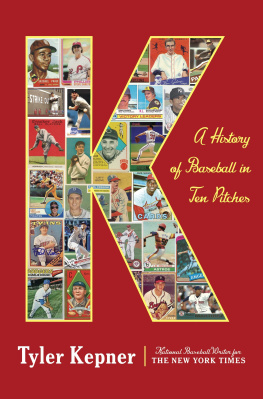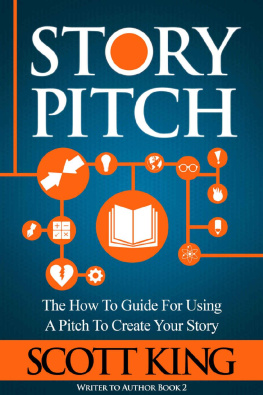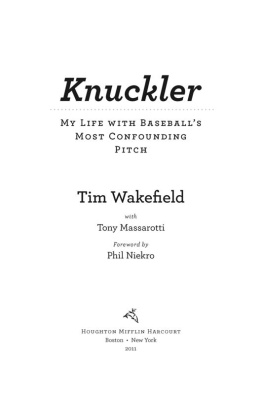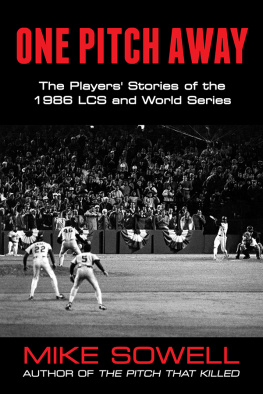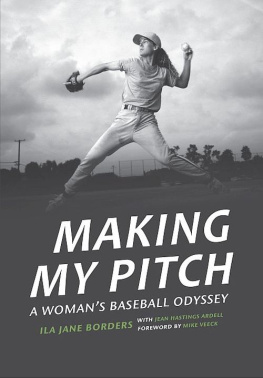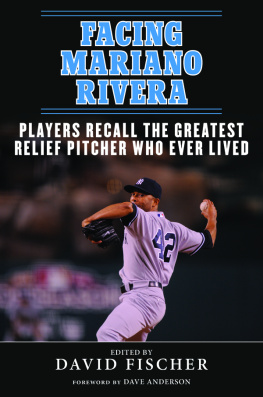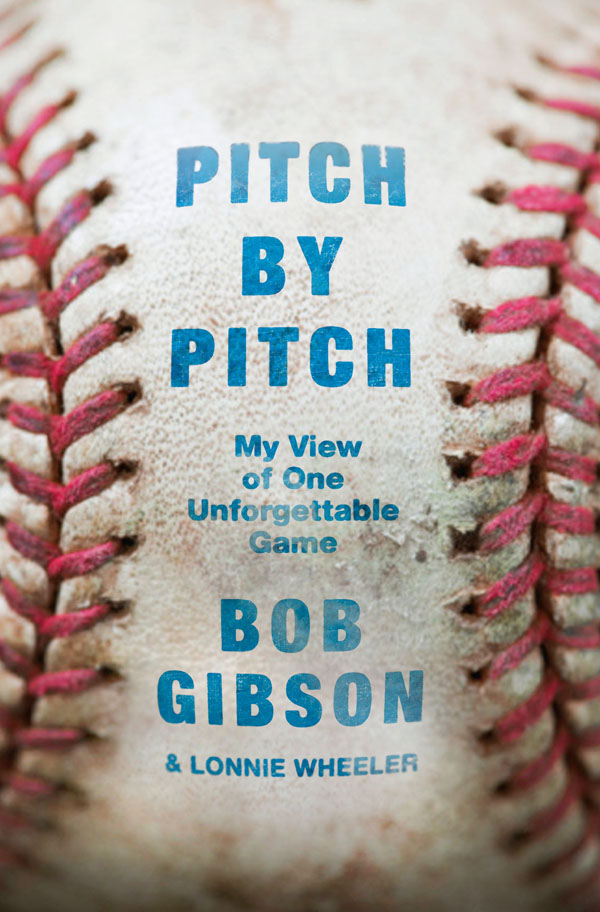Contents
Guide

The author and publisher have provided this e-book to you for your personal use only. You may not make this e-book publicly available in any way. Copyright infringement is against the law. If you believe the copy of this e-book you are reading infringes on the authors copyright, please notify the publisher at: us.macmillanusa.com/piracy.
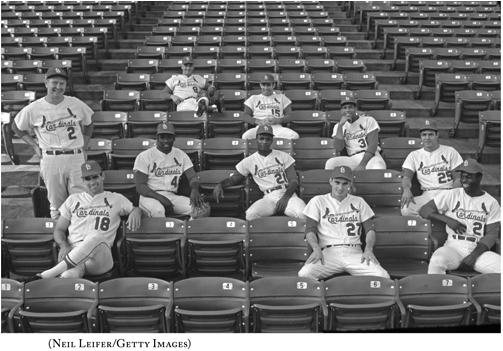
These were the guys who would take on the Detroit Tigers in game one of the 1968 World Series. They were the very same fellows who had successfully opposed the Boston Red Sox a year before, batting in the very same order. First row, from left: Mike Shannon (third base, batting sixth), Dal Maxvill (shortstop, batting eighth), and Lou Brock (left field, leading off). Second row: manager Red Schoendienst, me (pitching and batting ninth), my pal Curt Flood (center field, batting second), and Julian Javier (second base, batting seventh). Third row: Orlando Cepeda (first base, cleanup). Fourth row: my battery mate, Tim McCarver (catcher, batting fifth). In the back, making himself comfortable: Roger Maris (right field, batting third).
THERE IS MUCH I dont remember about the afternoon of October second, a muggy Wednesday in the Year of the Pitcher. It was, after all, forty-seven autumns ago, although, I have to say, I wouldnt have recalled a whole lot about that day even if youd asked about it that night. October second was my thirty-fifth pitching day of 1968, and on pitching daysespecially those in the World SeriesI wouldnt have noticed a barking elephant if it wore a flowered hat and sat in the commissioners popcorn. Whatever happened, if it didnt happen in Tim McCarvers mitt, I probably missed it.
So I have no recollection of the events that accompanied or preceded those nine innings, such as, say, what I ate for breakfast that morning, except that, in the case of breakfast, I can testify that it probably wasnt pancakes and sausage because food didnt particularly interest me on pitching days. The year before, on the morning of game seven in Boston, Id had scrambled eggs in mind, in part because the air-conditioning at our hotel didnt work and I hadnt slept too well, but after forty-five minutes of waiting for my order in the restaurant off the lobby, during which time my wife and the McCarvers and Dal Maxvill and his wife had all been served, the waitress brought me some blackened toast, which led to a lively discussion between the two of us. When my displeasure had been satisfactorily vented, I marched my empty stomach straight to the bus, which had been delayed on my behalf, and ultimately did just fine on a ham-and-egg sandwich that Bob Broeg of the St. Louis Post-Dispatch picked up for me at a diner and brought to the clubhouse. Actually, he brought me two of them, but I stashed the other one in my locker for after the game, which we won on a three-hitter. I could pitch hungry.
Even the pregame machinations of the Cardinal clubhouse were mostly beyond the pale of my cognizance, it being my custom to catch a few winks about an hour before taking the mound. After batting practice Id get comfortable on the training table and when Doc Bauman was finished massaging and stretching my arm hed pull a towel over my head to muffle my snoring.
I tended not to talk to people on the days I pitched, and people tended not to talk to me, but the World Series attracts fair-weather media types who arent up to speed on the protocol. In the early afternoon of October second, one of them, a television reporter, asked me, unadvisedly, what I thought of the civil rights rally held that morning under the Gateway Arch, which was only a few blocks away, towering over the left-field scoreboard of Busch Memorial Stadium. Ordinarily, and particularly in 1968, I was sensitive to those kinds of things, and willing to share the awesome wisdom of my opinionsbut not on pitching days, for pitys sake. Certainly not on this pitching day. My mind was where it needed to be, and the very thing I wanted least, just before my biggest start of the season, was a distraction. I told the guy I didnt give a hoot, only I didnt say hoot (which happens to be a nickname of mine). Instead, I used a word of the same length that ensured my answer wouldnt grace the broadcast. Anyway, I had already offered my statement on racial questions with a button I placed over my locker before the Series. It said, Im not prejudiced. I hate everybody.
But we were talking about things that escaped my attention on every fifth day of the baseball season. Needless to say, I knew nothing, on October second, of the Tlatelolco Massacre1968, you may recall, was the year of much more than the pitcher, in many more countries than our ownin which hordes of protesting students were killed that day and night by police and military personnel in Mexico City.
I do, however, have a vivid memory of high fastballs to Norm Cash and tight sliders on the hands of Willie Horton. And for the less indelible pitches, theres a video.
On the video, which is black and white and blurry, I enter the scene in full stride, booking toward my workstation, appearing ready and eager but rather puzzled. As I approach the base of the mound I squint toward home plate, then the other way, then back again, as if searching for an usher, an explanation, a rest room, something. The first time or two I watched, I wondered what in the hell I was hoping to see out there. Finally, after one more rewind, I took note of the younger me reaching out with the glove, and I realized: of course, I was looking for the ball. I was thinking, Come on, whos got the damn ball? Lets go!
* * *
BY THE FIRST of September, when we led the National League by thirteen games, we knew damn well wed be playing in the World Series. Within a couple weeks, the Detroit Tigers, ahead by ten and a half in the American League, had removed any lingering uncertainty in the question of our opponent. No team would ever again find itself in the position we enjoyed in late 68.
The playoffs, which began in 1969, added a round of suspense and good baseballthen two rounds, now two and a quickie qualifierto the postseason; but there was a price to pay in purity. No longer does the World Series come with a guarantee that it will match the American Leagues best team against the Nationals, as determined by victories earned over six demanding months of championship competition.
For the Cardinals, the upshot was that we had a month to prepare for one team and seven games. Of course, in my case that didnt make much difference. While it gave us an extended look at the Tigers, the Tigers were able to train their sights on us all the while; and I didnt put a lot of stock in scouting reports, anyway, for reasons Ill get into later.
Nor did I bother to pace myself in September. Staying on schedule, I started six games that month and pitched every inning of them but one, which was the only regulation inning Id missed since late May (I did sit out the twelfth and thirteenth on a Sunday in early August). The first of those outings was a ten-inning 10 win at Cincinnati. The last, my 22nd victory, was a 10 decision over the Astros at Busch Stadium, and it left me with my regular four days of rest for the opener of the World Series. Perfect. I had a rhythm working and didnt care to trifle with it.
The final shutoutit was my thirteenth, which led both leagues and more than doubled my total from any other seasonbrought my earned run average down from 1.16 to 1.12, which is considered the record in the modern era. Some people assumed that the ERA record was my incentive for pitching nine innings that night, on the brink of the Series, in a game that had no pennant implications. I can assure you, that was not a factor. I didnt even know about it until after the game. Wasnt interested in that kind of thing. There was only one statistic that might haveno, would have motivated me in that respect: 20 wins. In fact, it happened that way in 1965, when I won my 20th game on the final day of the season. The same scenario would come up again in 1969, and that time I had to go twelve innings to get number 20. I would have pitched another twelve if I had to. These days, sabermetricians tell us that wins are a poor way to judge a starting pitcher. To me, they were everything.


